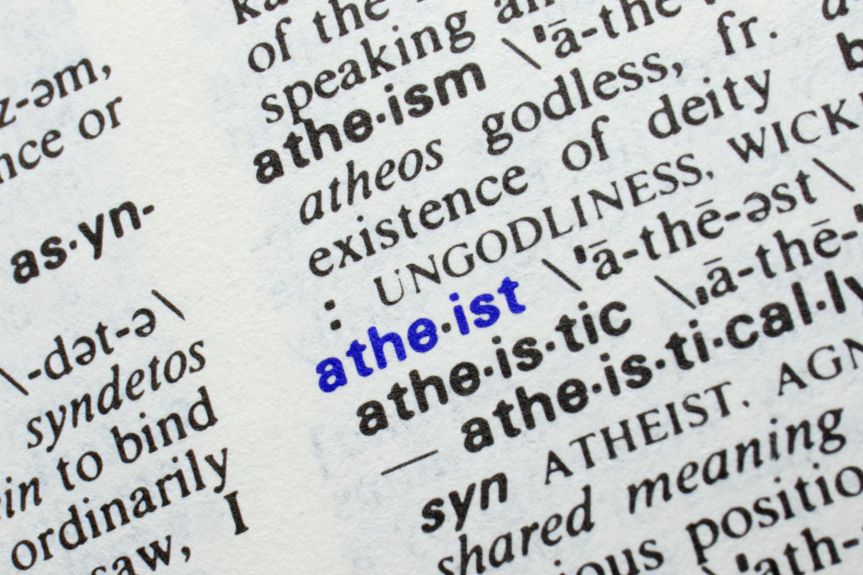Over my first cup of dark roast this morning, I wondered how the word “atheist” came to be. The term “atheist” has gotten a bit of a bad rap over the years. Back in the day, if you didn’t believe in the local deity, people would give you a weird gaze, thinking you were up to no good, like planning to overthrow the government or refusing to participate in the communal church potluck. Since most towns were basically giant church clubs, saying you weren’t into the whole God thing was like admitting you hated puppies. You were committing social suicide.
The word “atheist” comes from the Greek word “atheos,” which means “without god” or, for the drama lovers, “godless.” Back in ancient times, calling someone an atheist was the equivalent of saying, “Hey, you’re not going to any of our god parties, huh? Must be impious, immoral, or just didn’t get the memo.” But, as time marched on, “atheist” evolved. It went from being the ancient version of a social faux pas to a badge of honor for those who actively swipe left on the whole deity dating scene. Now, it’s less about forgetting to RSVP to the divine dinner and more about confidently stating, “Thanks, but I’ll pass on the god buffet; I’m not hungry for deities.”
The term “atheist” seems a bit out of touch, doesn’t it? It’s like saying, “Hey, the standard model involves believing in some sort of cosmic manager, and if you’re not on board, well, you’re off the team.” This assumption is about as fair as a game of Monopoly, where one player starts with all the properties. It’s a bit cheeky to expect the non-believers to prove their stance when the believers make some pretty bold claims. And let’s not even start on the religious diversity out there—it’s like saying, “Pick a card, any card,” but half the cards are from a completely different deck.
Calling someone an “atheist” is like labeling them a “non-unicorn rider.” It’s a roundabout way of saying, “So, what do you actually do for fun?” This label tells you nothing about a person’s passions, morals, or what they binge-watch at 2 AM. It’s like defining someone by their lack of interest in collecting stamps. Why not use labels that say something about a person’s beliefs, like “humanist” or “extremely online”?
Then there’s the awkwardness of the “atheist” label. It’s like drawing an arbitrary line in the sand and then being surprised when it causes beach blanket bingo brawls. This label has been loaded with all sorts of fun stereotypes: immoral, joyless, and possibly a supervillain. It’s no wonder some folks who might fit the description prefer to dodge it entirely, opting for “agnostic,” “spiritually allergic,” or “just really into science.” The term suggests that belief and reason are like oil and water, which overlooks all the times they’ve mixed quite nicely, like in discussions about ethics, the environment, or whether pineapple belongs on pizza.
In short, the word “atheist” might be ready for retirement. It’s a term that’s biased, about as clear as mud, and carries the joy of a wet blanket. It must capture the vibrant tapestry of human thought or contribute to world peace and understanding. It may be time to focus on what people are into rather than what they’re not and embrace a more inclusive chat about our cosmic (or not-so-cosmic) views without the side order of judgment.
Well, at least they can’t call me an atheist. I do believe in my Goddess Kaffeina. I recite the Kaffeinan Creed while in deep meditation every morning. Another cup, please.



I am antireligious…I am against any form of religion, especially the three Abrahamic religions, for which many people have died in wars, believing their religion was better than the others. https://www.pinterest.com/pin/500673683588707532/
Yeah, when a small population of a certain religion turn radical, it gives that particular religion a bad name. And the Abrahmic religions seem to have the most extremists of all the religions.
well, the hindus are giving them a run for their money with their new temple to Ram (Rama?). $180 million worth of crap in a country where they still poop on the streets.
People with money seem to be able to do anything they want in this world. I’ll bet this Ram temple (opens tomorrow) is exclusive to people with money and not for the poor. https://www.voanews.com/a/india-prepares-to-inaugurate-ram-temple-on-site-of-demolished-mosque/7448780.html
I think that is a good bet. IT seems that conservative religious nitwits always are making these things to pretend how important they are.